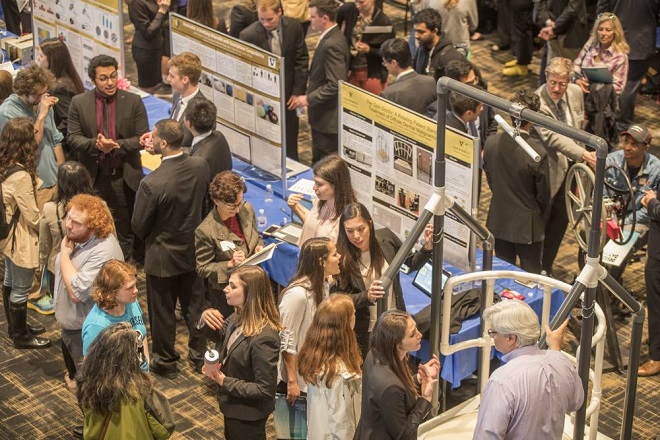
One team of senior engineering students designed a headband that detects oncoming tremors and signals a bracelet that vibrates, discreetly alerting the young girl wearing the accessories. She has a rare brain condition that causes periodic head and neck tremors but can control them with focused attention.
Another team developed a wrist-actuated partial prosthetic hand for a 9-year-old boy born with only a thumb and little finger on his right hand.
Students designed sensors for U.S. Navy divers and a habitat for humans living on Mars. They designed a system by which early responders can better evaluate burn victims, a more affordable prosthesis for dogs missing a lower limb, an all-electric system for a race car and a living building.
Design Day 2019 will showcase these and nearly 70 other projects by teams in biomedical engineering, chemical engineering, civil engineering, electrical engineering, mechanical engineering and computer science. This year’s open house is Monday, April 22, from 3-6 p.m. in the Student Life Center. The event is free and open to the public, and free parking is available in the staff and faculty garage at 2401 Highland Ave. (Zone 3 areas)
Discussion of potential projects and the rigorous process begins with the first or second meeting of the two-semester course. Sponsors and professors present project needs and, depending on the department, students rank their top choices.
“We are asking more of our students,” said Thomas Withrow, assistant dean for design and associate professor of the practice of mechanical engineering. “Senior design courses provide students with experience working on real-world projects that involve design constraints, budgets, reviews and deadlines. Students learn about professionalism, licensing, ethics, entrepreneurship and the day-to-day implications of intellectual property.”
Among the other projects:
- A plan and feasibility study for capping the surface under the Interstate 65 and 40 interchange with usable green space;
- A living building transportation hub and modular water system;
- A surgical video system;
- A manufacturing kit cart system with rotational guidance; and
- Air quality data collectors for Nashville’s B-cycles.
Machine learning is a big theme, with applications for everything from studying movement of financial markets to making March Madness predictions, from exploring police response times to classifying the success of boy bands.
The 2018-19 engineering faculty advisers in computer science are Maithelee Kunda and Jules White; electrical engineering, Ralph Bruce; mechanical engineering, Thomas Withrow and Jason Mitchell; biomedical engineering, Matthew Walker III; chemical and biomolecular engineering, Bryan Beyer, Russell Dunn and Scott Guelcher; and civil and environmental engineering, Lori Troxel.
New sponsors this year include the Nashville Civic Design Center, Cumberland River Compact, Inventiv Tools, FedEx Express and Halmos Technologies. Returning sponsors include Nissan North America, Siemens, Metova, DENSO, Polymer and Chemical Technologies, NASA’s Marshall Space Flight Center and NAVSEA.
Multiple Vanderbilt and Vanderbilt University Medical Center departments sponsored projects and provided advisers as well.